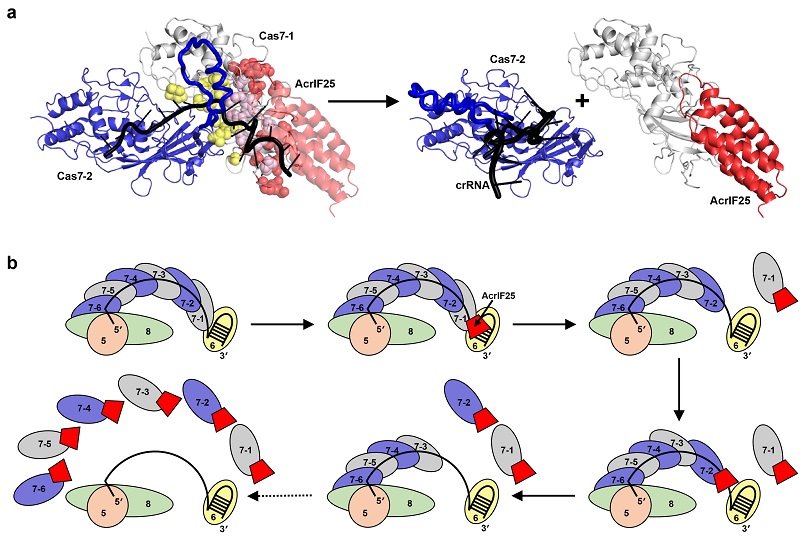
In a study published in Nature on July 3, researchers from the Institute of Biophysics of the Chinese Academy of Sciences and the University of Toronto, Canada, discovered a novel anti-CRISPR protein called AcrIF25, which inhibits the activity of the CRISPR-Cas system by dismantling the I-F type CRISPR-Cas complex (Csy complex), providing a new approach for precise control of the CRISPR-Cas system.
The CRISPR-Cas system is a powerful gene-editing tool widely used in bacteria and archaea to defend against the invasion of foreign DNA. To balance this potent defense mechanism, some bacteria and archaea have evolved proteins capable of inhibiting the activity of the CRISPR-Cas system, known as anti-CRISPR proteins (Acr).
In this study, the researchers first identified a new anti-CRISPR protein called AcrIF25 using bioinformatics. The in vivo assays showed that AcrIF25 significantly inhibited the activity of the I-F type CRISPR-Cas system of Pseudomonas aeruginosa.
Size exclusion chromatography results showed that AcrIF25 does not directly bind to the complete Csy complex, but specifically interacts with the Cas7 subunits and dissociates them from the Csy complex, thereby blocking the function of the CRISPR-Cas system.
To further elucidate the mechanism of AcrIF25, the researchers solved the crystal structures of AcrIF25 and the Cas7:AcrIF25 complex. They found that AcrIF25 interacts with Cas7 through its C-terminal domain, which covers the binding interface between Cas7 subunits and the interface between Cas7 and crRNA. Therefore, binding of AcrIF25 disrupts Cas7 interaction with adjacent Cas7 subunits and crRNA, leading to the disassembly of the entire Csy complex.
Notably, AcrIF25 can remove Cas7 subunits from the Csy complex without using energy derived from ATP hydrolysis. AcrIF25 is the first example of a protein that disassembles a large and stable protein-nucleic acid complex in the absence of an external energy supply.
This study not only enriches our understanding of the mechanism of Acr proteins, but also provides valuable clues for the development of new gene-editing tools in the future.

The molecular mechanism of AcrIF25 dissociating the Csy complex. (Image by WANG Yanli's group)

86-10-68597521 (day)
86-10-68597289 (night)

52 Sanlihe Rd., Xicheng District,
Beijing, China (100864)

